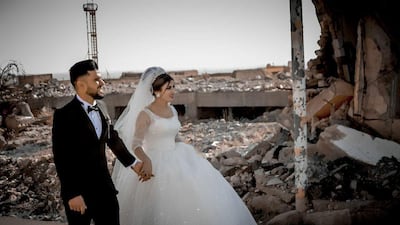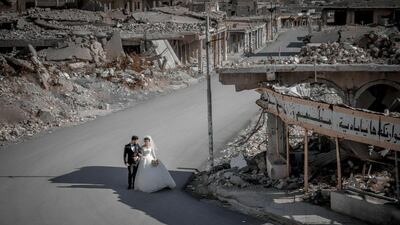It should have been a raucous affair, but newly-weds Mahir Qassim and Saifi Essa used their wedding day to send a quiet message.
In a bright white gown and a dapper tuxedo, the Yazidi couple look polished and serene; a stunning contrast to the setting – the ruins of Sinjar, their home city.
"The first message is that despite what we have gone through life continues, and we, mainly the youth, will not give up or leave our land," Mr Qassim, told The National.
"The second is to the Iraqi government and the world to remind them that Sinjar is still devastated and to spur the reconstruction efforts," he said.
In August 2014, the northern city of Sinjar, the ancestral homeland of the Yazidis who follow an ancient religion, faced a grim fate.
Nearly two months after ISIS began its onslaught on Iraq, capturing large areas in the north and west, the fanatics moved to Sinjar. They falsely branded Yazidis as devil-worshippers.
Tens of thousands of Yazidis fled to nearby Mount Sinjar, where most were rescued by the US-backed Iraqi forces. Thousands more were taken captive or murdered by ISIS.
Then, the militants separated women and men, selling the women into sexual slavery and sending the men to their deaths.
By late 2015, Sinjar was liberated but at a hefty price. Most of the city was demolished either by ISIS militants who blew up Yazidi houses or by military operations to reclaim the city.
Mr Qassim’s family was lucky enough to not have endured the ISIS atrocities.
Most of his relatives escaped to the nearby Dahok province in the safe northern Kurdish region when the militants arrived.
The militants freed his elderly mother and nephews after a week in captivity, while his older brother spent eight months in custody.
They joined thousands of Yazidis who found shelter in internally displaced people camps in the Kurdish region.
Four years later, Mr Qassim has returned to his home town for the first time, but as a volunteer with an international non-governmental organisation.
“I can’t describe my feelings when I entered the city and saw the huge devastation,” the 27-year old graduate of the Economy and Administration Institute said.
“I had mixed feelings, I was happy to set my foot again on my land, but shocked, disappointed and angry.”
In July, the whole family returned to Sinjar. Their Arab neighbour offered his house for free as theirs was flattened.
“Nothing is left in Sinjar and it is a scary city now. All these years since liberation, the homes and buildings are still destroyed and there are no adequate public services, mainly electricity and potable water,” Mr Qassim said.
Since liberation, the city and surrounding areas have been under the control of many armed groups, including Iraqi army and Shiite, Yazidi and Kurdish militias.
Some of Yazidi factions are allies to the Turkish PKK fighters who took part in the military operation to recapture the city. The PKK is a Kurdish separatist group that has been fighting a decades-long insurgency in Turkey for independence.
In an effort to enforce security and help thousands of IDPs to return, Baghdad and the Kurdish region struck a deal last month. The deal calls mainly for PKK to leave the city and to recruit 2,500 local security personnel.
Iraqi army and police personnel were sent to Sinjar this week, Mr Qassim said, expressing concerns over what the coming days will bring.
“Sinjar is full of parties with different loyalties,” he said. “The situation inside Sinjar is like a booby-trapped balloon: if anyone gets closer it will explode,” he added.
Some joy has come of returning. The couple fell in love when both were working as volunteers with NGOs.
“Since then, we planned to have our wedding in the ruins of Sinjar to underline our affiliation to our homeland and history despite everything that happened,” the bride, Saifi Essa, said.
Ms Essa and her extended family left Sinjar intact in 2014.
“I couldn’t keep my composure when I first returned and immediately burst into tears,” Ms Saifi, 29, said. “Many of our relatives and friends are either killed or still captives or fled the country,” she added.
According to local and international human rights organisations, around 7,000 women and girls were captured by ISIS militants, while hundreds of men were killed.
Nearly half of the captured women and girls eventually escaped their captives or were freed after their families won their release by paying ransom to militants. Around 3,000 Yazidi women are still missing.
Hundreds of mass graves for slain Yazidis were also left behind as a reminder of ISIS atrocities.
Unlike other Yazidi youth, the couple are determined to stay in Sinjar despite hardships they face every day.
“We will work for our Sinjar and plan more initiatives like this one to draw the world's attention and to keep its tragedy before their eyes,” she said.












